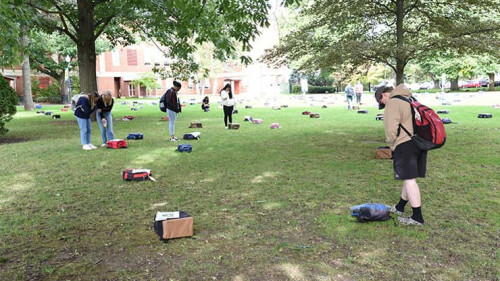
By Eric Guzman '12
As part of its history education lecture series, the Center for Revolutionary Era Studies (CRES) invited award-winning historian and Associate Professor of History at the University of Richmond Woody Holton, Ph.D. to share his work during a presentation titled, “Unruly Americans and the Origins of the Constitution.” Holton addressed several myths revolving around the adoption of the United States Constitution in 1787.
Holton explained that many of the rights that we enjoy today were not included in the original Constitution when the framers drafted it. In fact, he said the founding fathers believed that the common people of the United States of America were incapable of handling the democratic government that they established in 1776.
“The Revolution moved the colonists more toward the traditional Greek city-state Democracy,” said Holton. “The Constitution was meant to bring them back, it was meant to reverse the democratic currents.”
Holton said that prior to the adoption of the Constitution, there was an injustice of laws within the states and farmers used the power of the state legislature to lower their taxes and evade paying creditors. As a result, bondholders and private lenders suffered from the tremendous debt that accrued from such practices, which discouraged them from loaning additional capital. With this in mind, the framers of the Constitution wanted to make it difficult for farmers to create new laws and decided to impose strict taxes.
“At the time in 1787, the United States was suffering a recession characterized by failing real estate, high tax protests, high government debt and dearth of capital. The Constitution was meant to solve these issues,” said Holton.
In order to encourage creditors to continue loaning money to jumpstart the economy, the framers decided to draft a Constitution that would enable individuals to be sued for not paying back loans. With this mindset, lenders knew they could sue if they didn’t receive payment, making them more comfortable lending capital.
“I think that the authors were sincere in believing ordinary Americans were irresponsible and broke the economy … but I want to say that they were wrong about that … that common people were just being broken by taxes that were two to three times higher than they ever paid as British citizens.”
Holton’s perspective brought the un-democratic ideal at the foundation of our Constitution into question. He believes, however, that with the evolution of the document today, with the Bill of Rights and additional amendments, “We have turned the Constitution into an underdog Constitution. Originally written as an anti-democratic document, we have turned it in such a way that I think we have more in common with those who were originally opposed than those who supported it.”
The next CRES event will be the annual Day of Living History on April 28. Siena's front lawn will be filled with presentations by re-enactors of the French and Indian War, American Revolution, War of 1812, Civil War, World War II as well as representatives of the modern military.
Photo Credit: Emily Merritt '12



